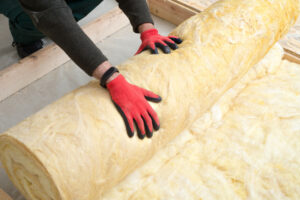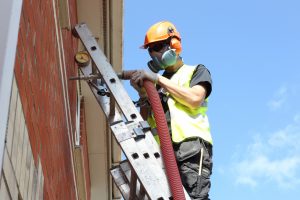Cavity Wall Insulation Funding Explained
Rising energy costs have UK homeowners seeking ways to lower heating bills while keeping their homes warm. Government-backed grants now offer free or discounted insulation, including cavity wall insulation, helping eligible households save hundreds on energy each year.
What Is Cavity Wall Insulation and How Does It Work?
The insulation of your home’s cavity walls is quite simple, insulating material is filled in the gap between your home’s inner and outer walls, with most homes built between 1920 and 1990 having cavity walls. These were designed with a space to prevent moisture transfer but were often left empty during the construction of the property.
Types of Insulation Materials
Modern cavity wall insulation uses several types of insulation materials:
- Blown mineral wool: Fire-resistant fibres that create excellent thermal barriers
- Polystyrene beads: Lightweight expanded beads that fill cavities completely
- Polyurethane foam: Expanding foam that seals gaps and provides superior insulation

How It Transforms Your Home
Cavity wall insulation that is properly installed can help prevent up to 33% of heat loss through your walls, which provides a helping hand to your heating systems’ workloads, leading to much lower energy bills and a more consistent indoor temperature through the year.
The insulation creates a thermal barrier that keeps warm air inside during winter and prevents excessive heat gain during summer, making your home more comfortable year-round.

Who Qualifies for Cavity Wall Insulation Funding in 2025?
Funding is not available to everyone, with eligibility depending on several factors. Some of these factors include your financial circumstances, the type of property that you live in, and the current energy efficiency rating.
Benefit Recipients
Homeowners receiving qualifying benefits automatically qualify for ECO funding. These include:
- Pension credit (guarantee or savings credit)
- Universal Credit
- Income Support
- Income-related Employment and Support Allowance (ESA)
- Income-based Jobseeker’s Allowance (JSA)
- Child Tax Credits or Working Tax Credits
- Housing Benefit
- Disability Living Allowance
Property Requirements
Your property must meet specific criteria:
- Council tax bands A-D in England, A-E in Scotland and Wales
- Cavity walls suitable for insulation (typically homes built 1920-1990)
- Energy Performance Certificate (EPC) rating of D, E, F, or G
- No existing cavity wall insulation
Income Group Thresholds
Even if you are not on any benefits, you may still qualify through LA FLEX (Local Authority Flexible Eligibility). Although these vary by the region you are in, these typically apply to households that earn less than £31,000 per year.
Think you may qualify? Contact us today!
Key Government Schemes Offering Support
Several government scheme initiatives provide funding for cavity wall insulation across the UK.
ECO4 Scheme
The ECO4 scheme represents the latest phase of the Energy Company Obligation, running until 2026. This energy company obligation requires major energy suppliers to fund efficiency improvements for eligible households.
ECO4 focuses on:
- Low-income households
- Properties with poor energy efficiency ratings
- Vulnerable households (elderly, disabled, or families with young children)
Local Authority Flexible Eligibility (LA FLEX)
Local authorities can refer households that don’t qualify for ECO funding but still need support. LA FLEX considers:
- Local fuel poverty rates
- Household income relative to local averages
- Properties in areas of high deprivation
Regional Variations
Scotland and Wales offer additional support through devolved programmes:
- Scotland: Home Energy Scotland provides advice and funding coordination
- Wales: Nest scheme offers comprehensive energy efficiency support
These regional programmes often work alongside national schemes to maximise available funding.
What’s Included in Cavity Wall Insulation Funding?
Free cavity wall insulation funding typically covers the complete installation process, but may include additional energy efficiency measures.
Standard Coverage
Your grant will typically include:
- Professional property survey and assessment
- All insulation materials and installation
- Post-installation inspection and certification
- Guarantee on materials and workmanship (usually 25 years)
Additional Measures
Many schemes offer comprehensive packages that might include:
- Central heating system upgrades or repairs
- Heating controls such as programmable thermostats and thermostatic radiator valves
- Air source heat pump installation for properties without gas connections
- Loft insulation to complement wall insulation
- Gas boiler replacement if your current system is over 15 years old
Heat Pump Integration
For properties off the gas grid, funding may cover air source heat pump installation alongside insulation. These heat pumps work more efficiently in well-insulated homes, making the combination particularly effective for reducing energy costs.
How to Apply for Cavity Wall Insulation Funding
Applying for cavity wall insulation funding involves several straightforward steps, though the process varies slightly depending on which scheme you’re applying through.
Step 1: Initial Assessment
We are able to:
- Check your eligibility against current criteria
- Arrange a free property survey
- Assess your home’s suitability for cavity wall insulation
Step 2: Professional Survey
A qualified surveyor will visit your property to:
- Confirm you have unfilled cavity walls
- Check for any structural issues
- Measure the work required
- Identify any additional measures needed
Step 3: Application Processing
We will:
- Submit your application to the relevant energy supplier or local authority
- Arrange funding approval
- Schedule installation once approved
Step 4: Installation
As Government licensed and registered installers, we will:
- Complete the installation in typically 2-4 hours
- Provide certification of completed work
- Arrange any follow-up inspections required
Working with experienced providers ensures smooth navigation of the application process and maximises your chances of securing funding.

Why Now Is the Time to Make Your Home Warmer.
With energy prices remaining high and government funding readily available, 2025 presents an ideal opportunity to improve your home’s energy efficiency. Cavity wall insulation offers immediate benefits that extend far beyond reduced heating bills.
Long-term Value
Cavity wall insulation provides decades of benefits:
- Lower energy bills: Savings of £100-£400 annually depending on property size
- Improved comfort: More consistent temperatures and reduced draughts
- Environmental impact: Significant reduction in your home’s carbon footprint
- Property value: Enhanced EPC rating can increase property value
Health and Wellbeing
Better insulation creates warm homes that support better health outcomes, particularly important for elderly residents or those with respiratory conditions. Consistent temperatures reduce condensation and associated mould risks.
Taking Action
Don’t wait for energy prices to rise further. Energy efficiency grants UK funding is available now, but schemes have limited budgets and may close once allocated.
Check your eligibility today and take the first step towards a warmer, more efficient home.

Lifetime Savings Insulation Surveyor
Frequently Asked Questions
Can I get cavity wall insulation funding?
Yes, if you meet the eligibility criteria including benefit receipt or income thresholds, own a suitable property, and have unfilled cavity walls.
How much is cavity wall insulation?
Without grants, cavity wall insulation typically costs £500-£1,500. However, eligible households can receive this completely free through government schemes.
How long does cavity wall insulation last?
When installed properly, the cavity wall insulation should last at least 25 years without much maintenance required, making it an excellent long-term investment.
Does cavity wall insulation cause damp?
Cavity wall insulation doesn’t cause damp if it is installed in the correct properties by professionals. Proper surveys before any work is started will detect any moisture issues that exist beforehand.
Is cavity wall insulation worth it?
Absolutely. With potential annual savings of £100-£400 and free installation for eligible households, cavity wall insulation offers excellent value.
How to tell if I have cavity wall insulation?
Check your external walls — if bricks are laid in stretcher bond (all bricks showing their long side) and walls are 250mm+ thick, you likely have cavity walls. Small drill holes in mortar joints may indicate existing insulation.
Does cavity wall insulation need replacing?
Quality insulation installed to current standards rarely needs replacing. Older cavity wall insulation made with inferior materials may benefit from an upgrade.
Does cavity wall insulation cause condensation?
Proper installation should reduce condensation by maintaining warmer internal wall surfaces. This also aids in improving overall thermal performance.
Am I eligible for cavity wall insulation?
Eligibility depends on your income, benefits, property type, and current insulation status. A free assessment can determine your eligibility.
Are there grants for cavity wall insulation?
Yes, multiple government schemes including ECO4 and LA FLEX provide grants for eligible households.
How to apply for cavity wall insulation grants?
Contact us and we will assess your eligibility, provide a free survey of your property, and handle the application process on your behalf.
Alternatively, check out our Cavity Wall FAQ page and pop your postcode in to book a free survey!